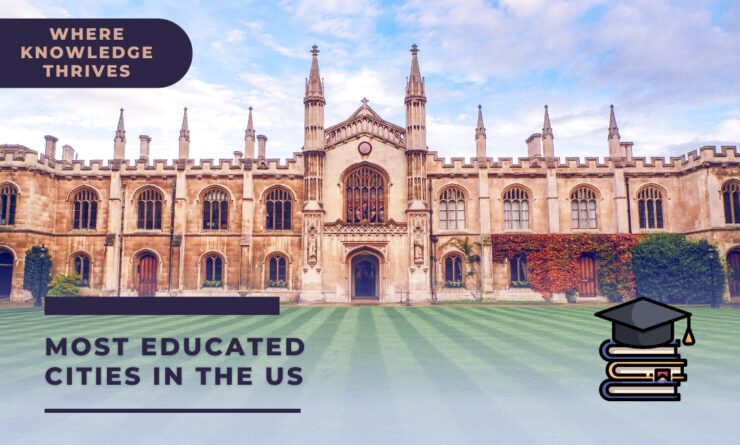In this exploration, we delve into the top 20 scholarly hubs in the United States. If you’re not interested in our comprehensive breakdown of educational achievements across the nation’s metropolises, feel free to jump straight to our highlight reel of the Top 5 Most Educated Cities in the US.
Last year in February, the US Census Bureau shared its insights on the educational landscape of the United States in 2021.
The decade-long study revealed an encouraging trend: the proportion of US residents aged 25 or older who had earned at least a bachelor’s degree had seen a significant increase, jumping from 30.4% in 2011 to 37.9% in 2021.
Breaking it down further, 23.5% of these individuals held a bachelor’s degree as their highest level of education, while 14.4% had advanced to a master’s or professional degree.
The crown for the most educated city in the US goes to Boulder, Colorado. An impressive 62.5% of its residents aged 25 and above have achieved a bachelor’s degree or higher.
When it comes to larger metropolitan areas with populations exceeding one million, the Washington Metropolitan Area steals the spotlight as the most educated city in the US, boasting a 53.4% population with at least a bachelor’s degree.
On the other end of the spectrum, Hanford, Corcoran, and El Centro in California are among the cities with the lowest levels of higher education attainment, with rates lingering at 13.5% or less.
20 Top Educated Cities
20. Pittsburgh (Pittsburgh, PA Metro Area)
With 38.1% of its population aged 25 and above holding a bachelor’s degree or higher, Pittsburgh, nestled in western Pennsylvania, proudly stands among the most educated cities in the US. The city is home to the esteemed Carnegie Mellon University, renowned for its science and technology programs.
Once known as the “Steel City,” has transformed into a technological and educational hub. The city’s rich history of industrial innovation has paved the way for advancements in technology, healthcare, and education.
Carnegie Mellon University, a world leader in robotics and computer science, and the University of Pittsburgh, known for its medical and research programs, contribute to the city’s educated populace.
19. Dallas (Dallas-Fort Worth-Arlington, TX Metro Area)
Dallas, the third-largest city in Texas, holds the 19th spot on our list with 38.3% of its population having a bachelor’s degree or higher. The Dallas-Fort Worth-Arlington metropolitan area houses several prominent educational institutions, including the University of Texas at Arlington.
A city with a vibrant economy, is a melting pot of culture, technology, and education. The city’s commitment to education is evident in its numerous universities and colleges. The University of Texas at Arlington, renowned for its research and academic programs, contributes significantly to the city’s educated workforce.
18. Columbus (Columbus, OH Metro Area)
Columbus, the capital city of Ohio, boasts a 39% higher education attainment rate for its population aged 25 and above, earning it a spot among the most educated cities in the US.
Capital of Ohio, is a city that values education. Home to the Ohio State University, one of the largest universities in the US, Columbus offers a variety of educational opportunities. The city’s commitment to education is reflected in its diverse economy, which includes industries such as healthcare, education, and technology.
17. Milwaukee (Milwaukee-Waukesha, WI Metro Area)
Known for its beer industry, Milwaukee, a city in Wisconsin, also celebrates a high educational attainment rate of 39.2%. The Milwaukee-Waukesha metropolitan area also has one of the highest numbers of college students per capita in the country.
Known for its brewing traditions, is also a city that values education. The city is home to several universities, including the University of Wisconsin-Milwaukee and Marquette University. These institutions, along with others, contribute to the city’s high percentage of educated residents.
16. Charlotte (Charlotte-Concord-Gastonia, NC-SC Metro Area)
The Charlotte metropolitan area, with a population of over 2.7 million, sees 39.3% of its residents aged 25 and above holding a bachelor’s degree or higher, making it a prominent educational hub in the US.
Major banking hub, is also a city that values education. The city is home to several universities, including the University of North Carolina at Charlotte. The city’s commitment to education is reflected in its diverse economy, which includes finance, healthcare, and technology sectors.
15. Kansas City (Kansas City, MO-KS Metro Area)
Kansas City in Missouri, bordering the state of Kansas, is another educated city with 39.5% of its population holding a bachelor’s degree or higher.
Known for its jazz music and barbecue, is also a city that values education. The city is home to several universities, including the University of Missouri-Kansas City and Rockhurst University. These institutions contribute to the city’s educated populace and diverse economy.
14. Richmond (Richmond, VA Metro Area)
Richmond, one of the oldest cities in the US and the capital of Virginia, holds a 40.2% higher education attainment rate. Given that Virginia is the seventh most educated state in America, Richmond’s place among the most educated cities is well-deserved.
A city with a rich historical background, is also a city that values education. The city is home to several universities, including Virginia Commonwealth University and the University of Richmond. These institutions contribute to the city’s educated populace and diverse economy.
13. Nashville (Nashville-Davidson-Murfreesboro-Franklin, TN Metro Area)
The Nashville metropolitan area, with a high-quality educational ecosystem, sees 40.2% of its population aged 25 and above holding a bachelor’s degree or higher. Nashville slightly edges out Richmond due to its larger population size.
Known as the “Music City,” is also a city that values education. The city is home to several universities, including Vanderbilt University and Tennessee State University. These institutions contribute to the city’s educated populace and diverse economy.
12. Chicago (Chicago-Naperville-Elgin, IL-IN-WI Metro Area)
Chicago, the largest city in Illinois, along with Naperville and Elgin, ranks 12th among the most educated cities in America. Over 40% of the population aged 25 and above have attained at least a bachelor’s degree.
Chicago, a city known for its architecture and deep-dish pizza, is also a city that values education. The city is home to several universities, including the University of Chicago and Northwestern University. These institutions contribute to the city’s educated populace and diverse economy.
11. Hartford (Hartford-East Hartford-Middletown, CT Metro Area)
Hartford, the capital city of Connecticut, the sixth most educated state in America, sees 41.4% of its population holding a bachelor’s degree or higher.
Known as the “Insurance Capital of the World,” is also a city that values education. The city is home to several universities, including the University of Hartford and Trinity College. These institutions contribute to the city’s educated populace and diverse economy.
10. Philadelphia (Philadelphia-Camden-Wilmington, PA-NJ-DE-MD Metro Area)
Philadelphia, home to globally recognized universities like the University of Pennsylvania, has a higher education attainment rate of 41.9%.
Known for its rich history and cheesesteaks, is also a city that values education. The city is home to several universities, including the University of Pennsylvania and Temple University. These institutions contribute to the city’s educated populace and diverse economy.
9. Atlanta (Atlanta-Sandy Springs-Alpharetta, GA Metro Area)
Atlanta, the capital city of Georgia, one of the 20 wealthiest states in America, sees over 42% of its population aged 25 and above having attained a bachelor’s degree or higher.
Atlanta, known for its peaches and southern hospitality, is also a city that values education. The city is home to several universities, including Georgia State University and Emory University. These institutions contribute to the city’s educated populace and diverse economy.
8. Baltimore (Baltimore-Columbia-Towson, MD Metro Area)
Baltimore, the largest city in Maryland, is home to the prestigious John Hopkins University. Nearly 43% of the city’s population hold an undergraduate or higher degree.
A city known for its Inner Harbor and crab cakes, is also a city that values education. The city is home to several universities, including Johns Hopkins University and the University of Maryland. These institutions contribute to the city’s educated populace and diverse economy.
7. New York (New York, NY-NJ-PA Metro Area)
New York, with its myriad of quality educational institutions, ranks seventh in the list of the most educated cities in the US. 43.6% of the city’s population has at least a bachelor’s degree.
Known as “The Big Apple,” is also a city that values education. The city is home to several universities, including Columbia University and New York University. These institutions contribute to the city’s educated populace and diverse economy.
6. Minneapolis (Minneapolis-St. Paul-Bloomington, MN-WI Metro Area)
The Minneapolis-St. Paul metropolitan area, the heart of Minnesota’s culture, politics, and economy, boasts a 44.7% higher education attainment rate. The area is home to prominent educational institutions like the University of Minnesota, University of St. Thomas, and St. Catherine University.
Minneapolis, known for its lakes and the Mall of America, is also a city that values education. The city is home to several universities, including the University of Minnesota and Augsburg University. These institutions contribute to the city’s educated populace and diverse economy.
5. Denver (Denver-Aurora-Lakewood, CO Metro Area)
Denver is the capital city of Colorado. It is also the state’s most populous and educated city, with an estimated 47.8% of the population aged 25 and above holding a bachelor’s degree or higher, according to the Census Bureau’s 2021 American Community Survey. The University of Colorado in Denver is a favored destination for local and international students.
4. Austin (Austin-Round Rock-Georgetown, TX Metro Area)
Austin ranks fourth on the list of the most educated cities in the US. It is the capital of the state of Texas. According to the Census Bureau, exactly 50% of the population have attained higher education.
The University of Texas in Austin is one of the top universities in the world as per the QS Rankings.
3. Raleigh (Raleigh-Cary, NC Metro Area)
Raleigh is the third most educated city in the US. The Raleigh-Cary metropolitan area in North Carolina is home to some of the finest educational institutions in the country such as the North Carolina State University which is the largest university in the Carolinas and was founded way back in 1887.
Other prominent institutions in the metro area are Meredith College and Shaw University. More than half of the population aged 25 and above in the city have completed at least an undergraduate degree.
2. Boston (Boston-Cambridge-Newton, MA-NH Metro Area)
Boston ranks as the second most educated city in the US. Together with Boston, Cambridge, and Newton, the Boston metropolitan area is home to some of world’s top universities for research and higher education.
Harvard University has its main campus in Cambridge. Overall, more than 51% of the city’s population aged 25 and above hold a bachelor’s degree or higher.
1. Washington (Washington-Arlington-Alexandria, DC-VA-MD-WV Metro Area)
Washington Metropolitan Area, that comprises Washington, Arlington, and Alexandria, tops the rankings of the most educated cities in the US. 53.4% of the area’s population have attained higher education, whether bachelor’s or above.
The George Washington University is situated in Washington, D.C., which is among the few universities in the United States with a congressional charter. Other well known centers of research and higher education here include Georgetown University and University of the District of Columbia.
What are the cities with the lowest levels of higher education attainment?
Hanford, Corcoran, and El Centro in California are among the cities with the lowest levels of higher education attainment, with rates lingering at 13.5% or less.
What is the educational attainment distribution in the US?
In 2022, the highest level of education of the population age 25 and older in the United States was distributed as follows: 8.9% had less than a high school diploma or equivalent, 27.9% had high school graduate as their highest level of school completed, 14.9% had completed some college but not a degree, 10.5% had an associate degree as their highest level of school completed, 23.5% had a bachelor’s degree as their highest degree, and 14.4% had completed an advanced degree such as a master’s degree, professional degree or doctoral degree.
How has the high school completion rate changed over the years?
The high school completion rate in the United States for people age 25 and older increased from 87.6% in 2011 to 91.1% in 2022.
How does educational attainment vary by sex?
In 2021, 29.4% of men age 25 and older had completed a high school diploma or GED as their highest level of educational attainment, compared with 26.5% of women age 25 and older.
Of adults age 25 and older who had completed a bachelor’s degree or more, 53.1% were women and 46.9% were men.
How does educational attainment vary by race?
From 2012 to 2022, the percentage of adults age 25 and older who had completed high school increased for all race and Hispanic origin groups.
The percentage of adults age 25 and older with a bachelor’s degree or higher also increased for all groups. For example, it increased from 34.0% to 41.9% for the non-Hispanic White population and from 14.1% to 20.6% for the Hispanic population.
Final Words
In conclusion, the United States has seen a significant increase in educational attainment over the past decade. This upward trend is reflected in the growing number of cities across the nation that boast a high percentage of residents with a bachelor’s degree or higher.
From Boulder, Colorado, to the Washington Metropolitan Area, these cities are not only educational hubs but also vibrant communities that value knowledge, innovation, and progress.













